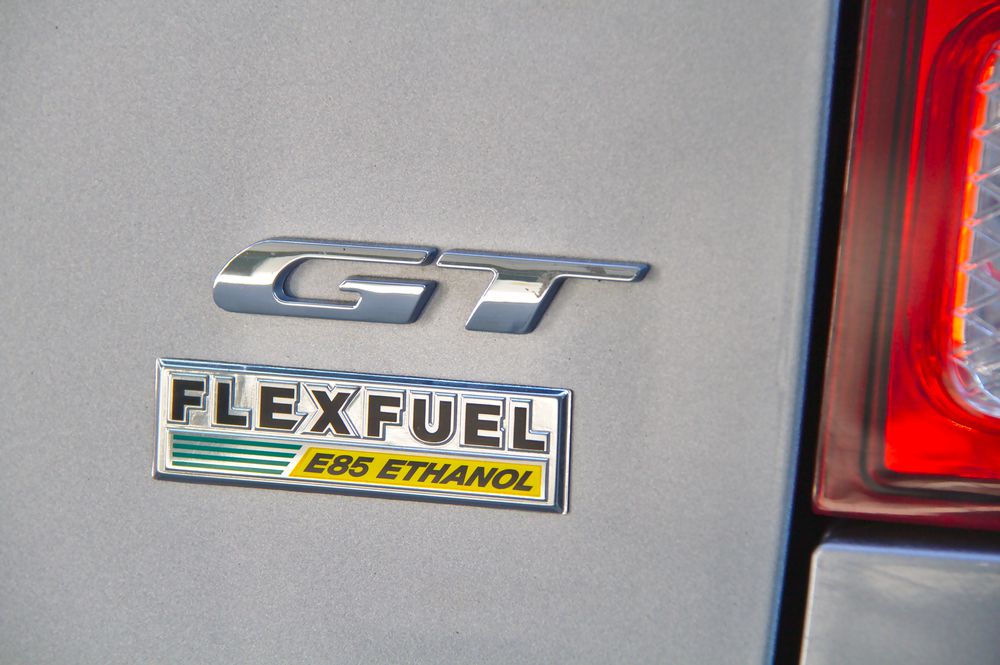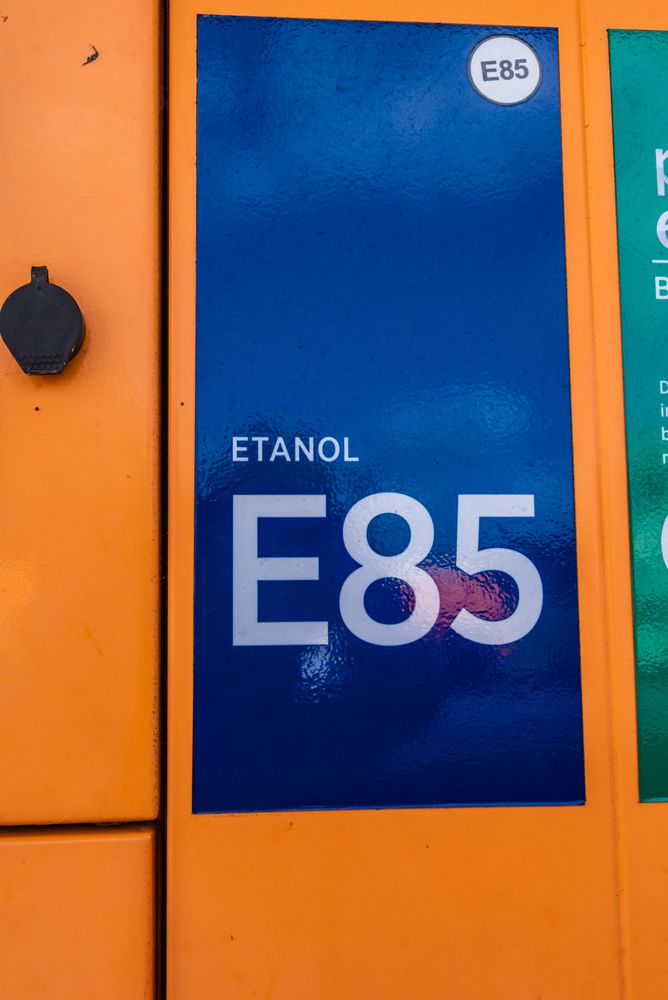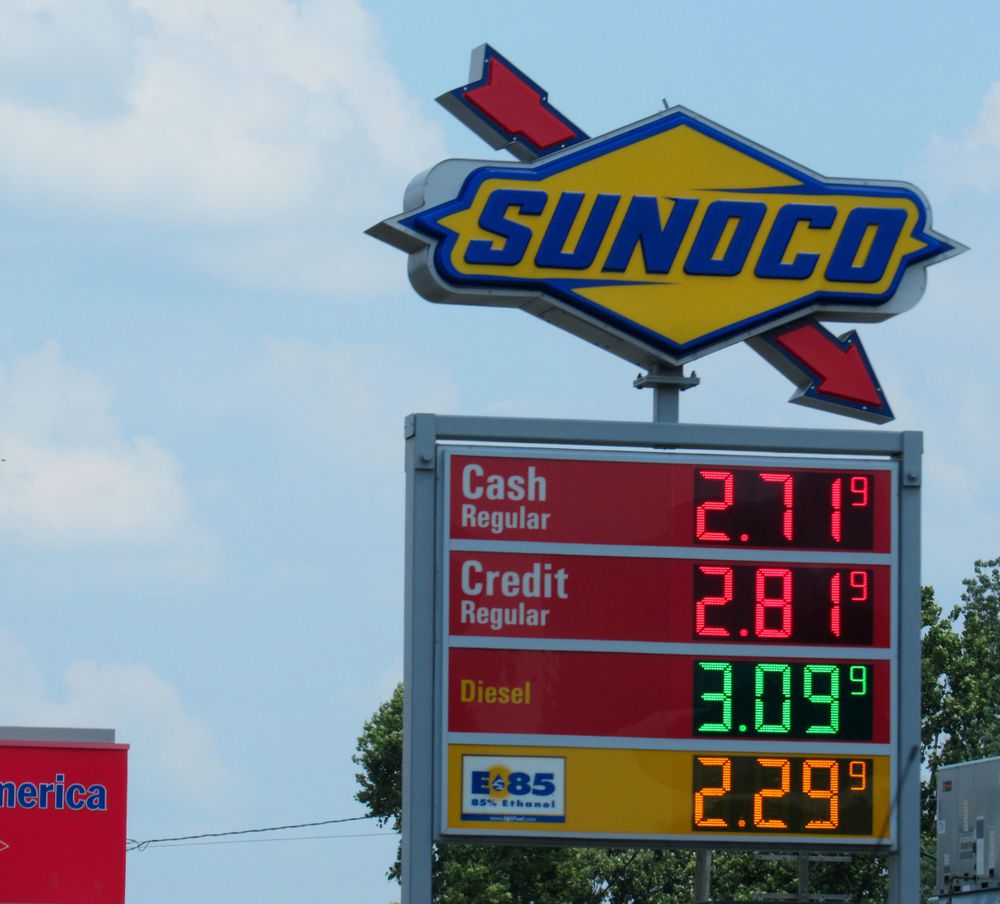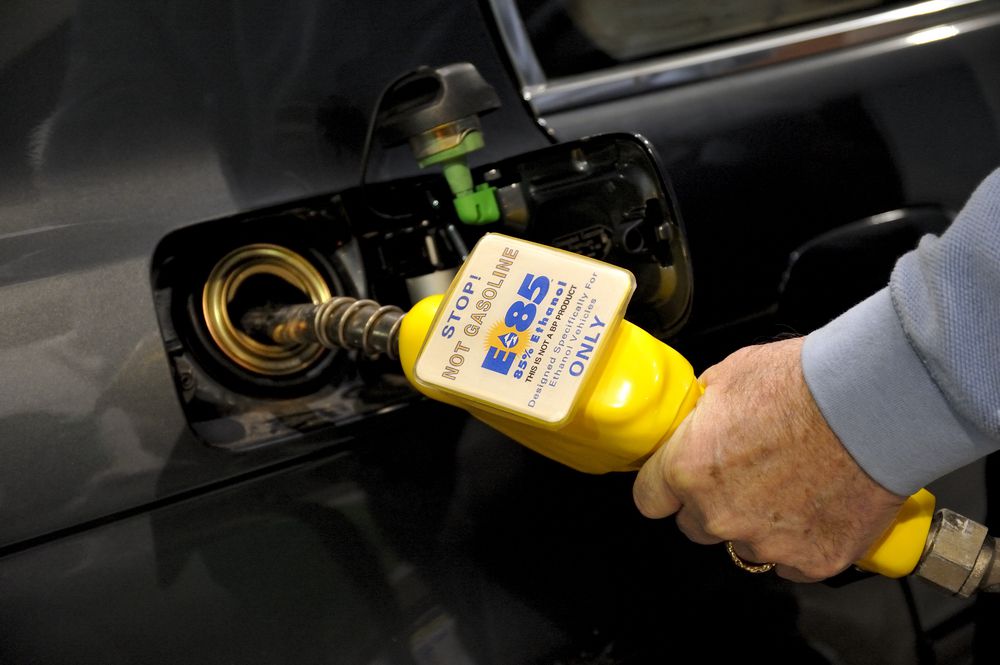E85, also known as flex-fuel, refers to ethanol-blended fuel containing 51% to 85% ethanol. In the United States, the ethanol in flex-fuel is derived from corn.
Although ethanol fuel reduces greenhouse gasses by around 50% and is cheaper than regular gas, ethanol-blended fuel gets lower fuel mileage making it more expensive to use overall.
Picking the right fuel for your car is important to ensure you get the best power and performance from your vehicle, but you also want to ensure that you're looking out for the long-term health of your car.
You might wonder: can I mix E85 with regular gas?
It's perfectly safe to mix E85 with regular gas so long as you have a flex-fuel vehicle designed to handle fuel with high levels of ethanol.
We'll discuss a few things to remember when discussing the differences between e85 and regular gasoline later in this article.
 E85 badge on vehicle
E85 badge on vehicle
What Is the Difference between E85 and Regular Gas?
E85 gas refers to fuel that has 85% ethanol and 15% gasoline. Ethanol fuels oxygenate and reduces pollutants caused by hydrocarbon emissions.
Ethanol is refined grain alcohol from natural products, including wheat, corn, and sugar cane.
Compared to regular gas, E85 has a higher octane rating, which simply measures the amount of compression fuel can withstand before detonating.
In layman's terms, a higher octane rating generally implies more compressive force and, therefore, more power in combustion engines.
Can You Mix E85 with 87, 89, 91, and 93 Octanes or Regular Gas?
It's perfectly safe to mix E85 with all different types of gas as long as you have a flex-fuel-certified vehicle.
The numbers 87, 89, etc., indicate the octane rating of the gas.
The gasoline type has little to do with whether it's safe to use with E85; instead, it denotes the 'power' of the gas, as it were.
 E85 fuel pump
E85 fuel pump
Can You Mix E85 and Premium Gas?
E85 is perfectly safe to mix with premium gas if you have a flex-fuel-certified vehicle.
Premium gas is generally considered a gas with an octane of 91 or higher.
As such, the gas composition that allows it to experience more compressive force before detonating doesn't have anything to do with how the two gas types mix, only the engine's effectiveness.
Is It Bad to Mix E85 with Regular Gas?
It's not bad to mix E85 with regular gas if you have a flex-fuel vehicle capable of using fuel sources up to 85% ethanol.
What Are the Disadvantages of Using E85?
One major disadvantage of using E85 is that you'll get less mileage on your vehicle.
While E85 has better anti-knocking properties that can increase engine power and an octane rating of 100 to 105, the engine has to burn 20-30% more fuel to match the rates of regular gas.
Simply put, E85 doesn't last as long and offers poor mileage.
It also has a reduced storage time and can cause pre-ignition, causing the pistons to fire improperly and potentially damaging internal components.
Another disadvantage to using E85 is the changeover time.
Put simply, when you swap over to ethanol-based gas, even E10, E15, or E30, there will be a changeover period where you'll have lower octane rates in your engine due to phase separation.
This can cause ethanol to dissolve deposits in the fuel system and tank, resulting in the upper layer depleting ethanol, resulting in a lower octane rating for a while.
To address this issue, you can do the following:
The most detrimental effect of E85 fuel is on vehicles that are not flex-fuel certified.
Filters in non-certified vehicles will break down over time when exposed to ethanol, causing severe damage to the structural integrity of internal components.
 E85 is cheaper than regular gas
E85 is cheaper than regular gas
What Happens if You Mix E85 with High Octane or Regular Gas?
Mixing E85 with high-octane gas is no problem.
There will be a changeover period where your engine will get a lower octane rating if you've been using exclusively gasoline to power your vehicle. Still, other than that, it's perfectly ok to use a mix of E85 and other types of gasoline.
How to Calculate the E85 Mix?
To calculate your mix, you can get an ethanol gauge to determine how much of your gas mixture is ethanol.
Keep in mind that E85 does not mean 85% in most cases.
As explained in our blog post here, E85 gases may have anywhere from 50-83% ethanol, which is within regulatory standards.
Will E85 Damage My Engine?
If you don't have a flex-fuel vehicle, E85 can seriously damage the filters and seals that keep everything nice and tight in your fuel system, causing significant damage over time.
E85 will not damage your engine if you have a flex-fuel-certified vehicle.
To check whether you have a flex-fuel car, you can do the following:
Look for a yellow gas cap or fuel filler ring
Check the fuel door
Check your owner's manual
Look for badges on the vehicle body
Most flex-fuel vehicles have yellow gas caps or a lining on the fuel filler ring that you can use to identify the vehicle.
Additionally, some cars have indicators on the fuel door or the car's body to tell you that you can use E85.
If all else fails, check your owner's manual.
It will have the final word on whether you can use E85 in your car.
 E85 fuel nozzle
E85 fuel nozzle
Does E85 Burn Hotter?
E85 has about 20-30% less heat per pound than regular gasoline.
Do You Get Better Gas Mileage with E85?
Gas mileage is decreased with E85 because it has a shorter storage time in the fuel tank, meaning some of it evaporates.
Additionally, the tank requires 20-30% more E85 usage, burning through your fuel supply more quickly.
Does E85 Give You More Power?
E85 offers a good power boost with compatible vehicles, upping the octane rate to 100 to 105.
Due to the properties of ethanol, it's a good power source for compatible engines.
Conclusion
E85 is a type of gasoline consisting of 85% ethanol and 15% gasoline (although it can be more like 50-50).
The high ethanol content allows for increased power and performance in a vehicle, offering an octane rating of 100 to 105.
Although the increased engine performance might be tempting, keep in mind that not all vehicles are flex-fuel certified to run ethanol fuel. If your vehicle isn't, you will do severe damage to the internal components by using it.
Check your vehicle by looking for a yellow gas cap or yellow ring on the fuel filler line.
If you have a flex-fuel vehicle, you can feel free to mix E85 with other types of gas with no issues beyond the changeover period, wherein your fuel tank is 'adjusting' to the change in the gas mixture.
During this time, there'll be a drop in octane rating.
If you choose to use E85, keep in mind that you'll want to do oil changes a little more frequently to keep the internal components lubricated, and you can expect to have to fill up at the gas station more often.
FAQ
Does E85 Affect Oil?
E85 isn't considered a danger to your oil mixture unless it's contaminated with water.
Contaminated E85 can turn into formic acid, damaging the engine by reducing the oil's capability to lubricate where necessary.
As long as you change out your oil frequently, E85 shouldn't be an issue.
What Does a Yellow E85 Gas Cap Mean?
A yellow E85 gas cap indicates that your car is flex-fuel certified.
Flex-fuel vehicles are built with seals and filters that are not susceptible to degradation from ethanol.
Most newer vehicles are flex-fuel certified, while older models may not be.
Having a yellow gas cap indicates that using E85 as fuel for your particular vehicle is safe.
It doesn't indicate that E85 is the necessary or preferred type of fuel for your car, however.
That decision is up to you to match performance, mileage, and gas mixture.
Why Is E85 So Cheap?
E85 is a lot easier to source and produce than regular gasoline.
Fossil fuels are a scarcer resource than corn, wheat, and sugar cane from which ethanol is refined, which shows in the price.
There are also many more political and economic stability factors that can influence the price of regular gasoline.
E85 isn't cheap because it's a lower quality of gas; instead, it's just something that's not for every vehicle.
Why Do Racers Use E85?
If there's anywhere you'll see E85 fuel; it's on the racetrack.
Big, beefy engines in racecars allow for dynamic utilization of ethanol-based fuels for maximum engine power.
Although it has poor mileage, ethanol offers an incredibly high octane rating, so racecar drivers use it for the best performance.
And, let's be honest, racing isn't about getting good fuel economy, is it?